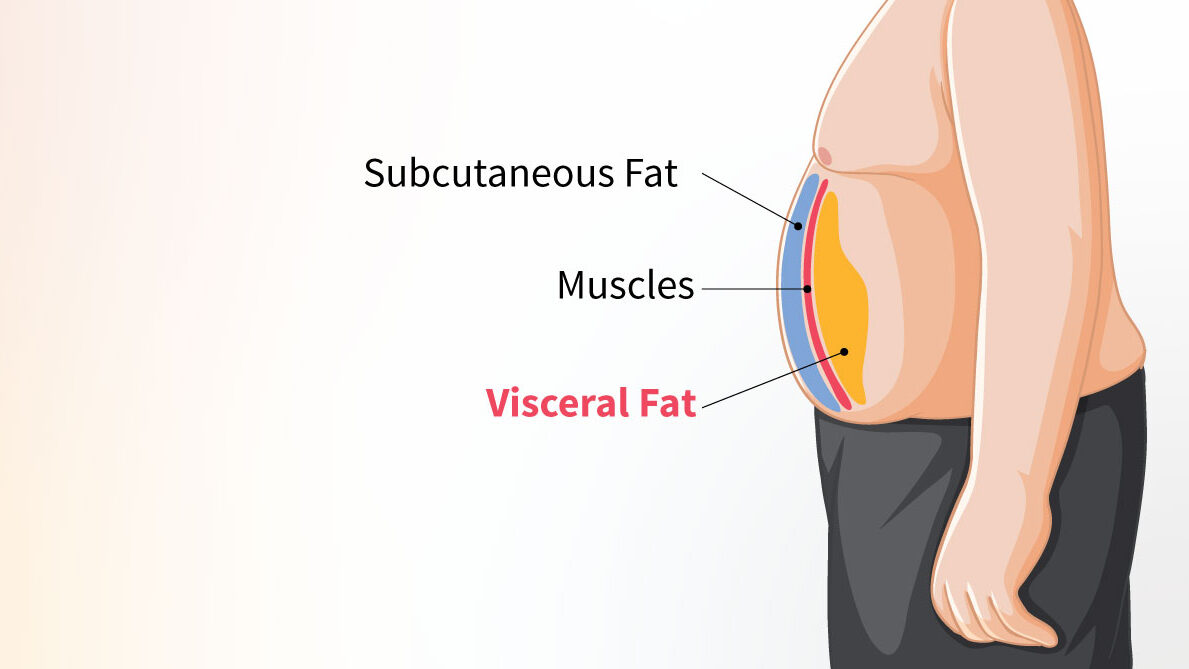
In the realm of excess body weight, a silent adversary lurks beneath the surface, posing a grave threat to our well-being. While the unsightly bulges of subcutaneous fat may be a common concern, there exists a more insidious form of fat that stealthily ravages our health from within – visceral fat. This internal fat depot, unlike the soft layers we can pinch, accumulates deep within the abdominal cavity, wrapping itself around vital organs like a sinister cloak.
The Treacherous Nature of Visceral Fat
Visceral fat is not an inert mass; it is a metabolically active entity that constantly secretes harmful substances into our bloodstream. This toxic exchange acts as a catalyst, triggering a cascade of health issues that can profoundly compromise our quality of life and longevity. The sinister nature of visceral fat lies in its ability to disrupt the delicate balance of our bodies, often without any outward signs or symptoms.
The Cardiovascular Peril
One of the most alarming consequences of excessive visceral fat is its impact on our cardiovascular health. The inflammatory compounds released by this internal fat can contribute to the buildup of plaque within our arteries, a process that significantly increases the risk of heart disease, stroke, and other life-threatening cardiovascular complications. As visceral fat levels rise, so does the strain on our heart and blood vessels, setting the stage for a potential medical crisis.
The Metabolic Mayhem
Visceral fat is also inextricably linked to a cluster of conditions collectively known as metabolic syndrome. This insidious combination of high blood pressure, elevated triglycerides, low HDL (good) cholesterol levels, and abdominal obesity creates a perfect storm that significantly elevates the risk of developing heart disease, stroke, and type 2 diabetes. It is a vicious cycle, where visceral fat fuels these metabolic disturbances, which in turn exacerbate the accumulation of visceral fat, creating a self-perpetuating cycle of ill health.
The Cancer Link
Emerging research has shed light on a potential connection between visceral fat and an increased risk of certain types of cancer. While the mechanisms are not fully understood, studies suggest that the inflammatory compounds and hormonal imbalances associated with visceral fat may play a role in the development of cancers such as breast, colorectal, and endometrial cancers. This unsettling link adds another layer of urgency to the need to address this hidden hazard.
The Breathing Burden
The excess weight concentrated around the midsection, a telltale sign of visceral fat accumulation, can also restrict breathing. As visceral fat deposits encroach upon the diaphragm and airways, it can lead to sleep apnea and other respiratory issues. These breathing disturbances not only disrupt sleep patterns and contribute to fatigue but can also exacerbate existing health problems, creating a vicious cycle that further compromises overall well-being.
The Silent Accumulation
Perhaps the most unsettling aspect of visceral fat is its stealthy nature. Unlike subcutaneous fat, which can be visibly apparent, visceral fat can accumulate silently, lurking within the confines of our abdominal cavity. It is entirely possible to harbor a dangerous amount of this internal fat even if our overall weight falls within a seemingly normal range. This covert accumulation makes visceral fat a hidden adversary, one that can wreak havoc on our health without any outward warning signs.
Combating the Unseen Enemy
While genetics undoubtedly play a role in the propensity for visceral fat accumulation, our lifestyle choices can either exacerbate or mitigate this hidden threat. A sedentary lifestyle, poor dietary habits, and excessive alcohol consumption can all contribute to the buildup of visceral fat. Conversely, adopting a proactive approach can empower us to combat this unseen enemy.
Incorporating regular physical activity into our daily routines is a potent weapon against visceral fat. Engaging in cardiovascular exercises and strength training not only helps burn excess calories but also targets stubborn visceral fat deposits. Additionally, adopting a balanced diet rich in whole, nutrient-dense foods can provide the nourishment our bodies need while minimizing the intake of harmful substances that contribute to visceral fat accumulation.
Stress management is another crucial component in the fight against visceral fat. Chronic stress has been linked to increased levels of cortisol, a hormone that can promote visceral fat storage. By incorporating stress-relieving practices like meditation, yoga, or other mindfulness techniques into our routines, we can mitigate this contributing factor and create an environment conducive to overall well-being.
Furthermore, it is essential to be proactive in monitoring our visceral fat levels. Seeking guidance from healthcare professionals and undergoing body composition analyses can provide valuable insights into our internal fat distribution, allowing us to make informed decisions and take targeted actions to address any concerning accumulations.
The Battle Within
While visceral fat may be out of sight, its impact on our overall well-being is far from invisible. This hidden hazard poses a multifaceted threat, undermining our cardiovascular health, metabolic balance, and respiratory function, and even increasing our susceptibility to certain cancers. However, by understanding the perils of visceral fat and embracing a holistic approach to health, we can wage a formidable battle against this unseen enemy.
Arming ourselves with knowledge, adopting healthier lifestyle choices, and remaining vigilant in monitoring our internal fat levels empower us to take proactive steps toward a healthier, more vibrant future. Remember, the war against visceral fat is not a fleeting skirmish but a lifelong commitment to prioritizing our well-being and fortifying our defenses against this silent adversary.
In the pursuit of optimal health, we must not underestimate the significance of visceral fat. By exposing this hidden hazard and confronting it head-on, we can reclaim control over our bodies and safeguard our most precious asset – our health.

Leave a Reply